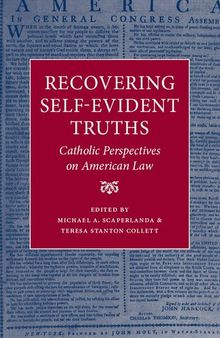 جزییات کتاب
جزییات کتاب
This book presents an engaging collection of essays exploring "catholic" and "Catholic" perspectives on American law―catholic in their claims of universal truths, and Catholic in their grounding in the teachings of the Roman Catholic Church. What emerges is a model of human freedom and flourishing that has its foundation in the transcendent vocation of each and every human person. The 2000-year-old Catholic Church played a pivotal role in the formation of the western legal culture. Does it have anything of relevance left to offer that culture in the 21st century? The contributors to Recovering Self-Evident Truths answer with a resounding yes. The opening essays present the guiding premises of the volume as a whole: human persons must be respected by governments and law because their objective dignity arises from being made in the image and likeness of God. Reasoning from these premises, the next set of essays situates the person within community, exploring the implications for the American legal system of taking seriously Catholic understanding of subsidiarity, solidarity, the common good, and the relationship between freedom and truth. The next set of essays concludes the foundational material by engaging dominant secular political and legal theory from a Catholic perspective. With the foundation set, the essays in the second half of the book explore eight specific substantive areas of the law―Contract Law, Property Law, Tort Law, Criminal Law, Labor Law, Family Law, Immigration Law, and International Law―through a Catholic lens. Recovering Self-Evident Truths is particularly timely: a majority of the justices on the United States Supreme Court are Catholic; Catholics represent a pivotal voting demographic in the American political landscape; and the issue of religion and religious values in the public square is hotly debated as some warn against a creeping theocracy. This book demonstrates that religiously founded values can serve to provide constructive proposals for building a more just society.



 دانلود کتاب
دانلود کتاب

 جزییات کتاب
جزییات کتاب





 این کتاب رو مطالعه کردید؟ نظر شما چیست؟
این کتاب رو مطالعه کردید؟ نظر شما چیست؟
